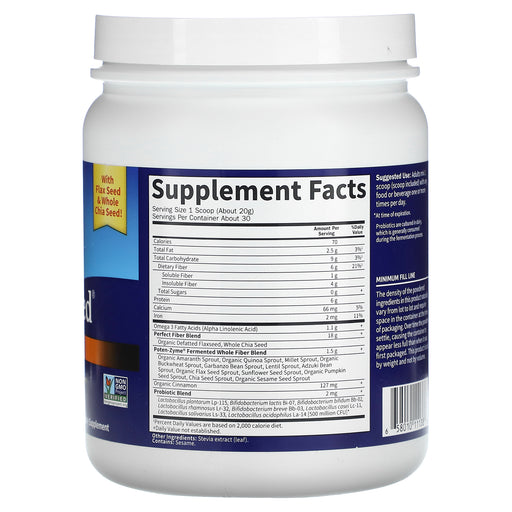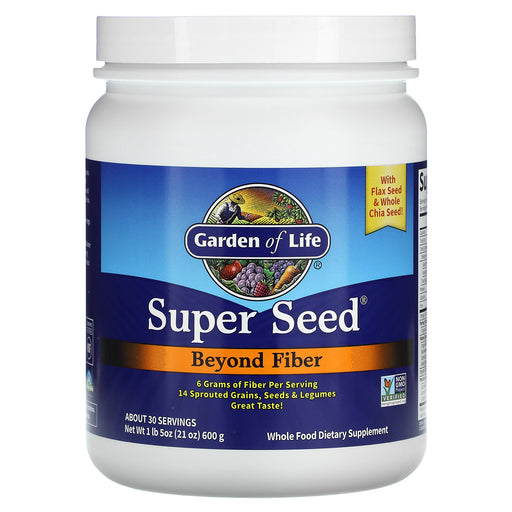
Optimizing Digestive Health and Nutrient Absorption with Comprehensive Fiber Blends
Fiber is a vital nutrient that plays a crucial role in maintaining digestive health, promoting regular bowel movements, and supporting overall well-being. While all types of fiber offer health benefits, combining different fibers in a comprehensive blend can provide a synergistic effect, optimizing digestive function, nutrient absorption, and gut microbiome balance. Fiber blend supplements make it easy to obtain a diverse array of fibers in one convenient product, ensuring you reap the full spectrum of benefits this essential nutrient has to offer.
The Advantages of Fiber Blends
Incorporating a comprehensive fiber blend supplement into your wellness routine can offer numerous potential benefits for your digestive health and overall well-being:
- Digestive Regularity: Fiber blends typically include a combination of insoluble and soluble fibers, which work together to promote regular bowel movements, improve stool consistency, and support optimal transit time through the digestive tract.
- Constipation and Diarrhea Relief: By balancing both insoluble and soluble fibers, fiber blends can help alleviate both constipation and diarrhea, promoting more comfortable and efficient digestive function. Certain fibers, like psyllium husk, work in synergy with magnesium to promote muscle relaxation and regularity in the digestive tract.
- Gut Microbiome Support: Many fiber blends include prebiotic fibers, such as inulin and fructooligosaccharides (FOS), which serve as food for the beneficial bacteria in the gut. By supporting the growth and diversity of these crucial microorganisms, fiber blends can help maintain a healthy, balanced gut microbiome. Combining prebiotic fiber blends with probiotic supplements can further optimize gut health.
- Enhanced Nutrient Absorption: Soluble fibers in fiber blends help slow down the digestion and absorption of nutrients, allowing for more complete and efficient uptake of vitamins, minerals, and other essential compounds. This can be particularly beneficial for maintaining steady energy levels and blood sugar balance throughout the day.
- Cardiovascular Health: Many fiber blends include soluble fibers, such as beta-glucan and psyllium husk, which have been shown to help lower total and LDL (bad) cholesterol levels, reducing the risk of heart disease. These fibers work alongside heart-healthy nutrients like omega-3 fatty acids and plant sterols to support optimal cardiovascular function.
- Weight Management Support: Fiber blends can help promote feelings of fullness and satiety, reducing overall calorie intake and supporting healthy weight management. By slowing down digestion and promoting stable blood sugar levels, fiber blends can also help reduce cravings and prevent overeating. Combining fiber blends with other weight management-supportive nutrients, such as green tea extract and conjugated linoleic acid (CLA), can further enhance their effects.
Key Ingredients in Fiber Blend Supplements
Fiber blend supplements often contain a diverse array of fibers, each with unique properties and potential health benefits. Some of the most common and well-studied fibers found in these comprehensive blends include:
- Psyllium Husk: A soluble fiber known for its ability to promote regularity, alleviate constipation, and support healthy cholesterol levels.
- Inulin: A prebiotic, soluble fiber that serves as food for beneficial gut bacteria, promoting a healthy, diverse microbiome and supporting overall digestive health.
- Fructooligosaccharides (FOS): Another prebiotic fiber that helps nourish the gut microbiome and support digestive function.
- Beta-Glucan: A soluble fiber found in oats and barley that has been shown to help lower cholesterol levels and support cardiovascular health.
- Methylcellulose: A semi-synthetic, soluble fiber that helps normalize bowel function, relieve constipation, and promote feelings of fullness.
- Flaxseed: A rich source of both soluble and insoluble fiber, as well as health-promoting omega-3 fatty acids and lignans, flaxseed supports digestive health, cardiovascular function, and hormone balance.
- Acacia Fiber: A prebiotic, soluble fiber that helps nourish beneficial gut bacteria, promote regularity, and support overall digestive comfort.
Choosing the Best Fiber Blend Supplement
When selecting a fiber blend supplement, consider the following factors to ensure you are getting a high-quality, effective product that meets your unique health needs:
- Diverse Fiber Profile: Look for fiber blends that contain a wide range of both soluble and insoluble fibers, as well as prebiotic fibers, to ensure you are getting a comprehensive approach to digestive health support.
- Quality and Purity: Choose fiber blends manufactured by reputable brands in GMP-certified facilities, ensuring the highest standards of quality, purity, and safety.
- Effective Dosage: Select fiber blends that provide a clinically relevant dose of each type of fiber, typically ranging from 5-10 grams of total fiber per serving, to ensure optimal digestive health benefits.
- Tolerability and Ease of Use: Consider fiber blends that are well-tolerated and easy to incorporate into your daily routine, such as powders that can be mixed into beverages or capsules that can be taken with meals.
- Synergistic Ingredients: Some fiber blends may include additional gut-supportive nutrients, such as probiotics, digestive enzymes, or beneficial herbs like ginger or fennel, for a more comprehensive approach to digestive wellness.
Tips for Incorporating Fiber Blend Supplements into Your Wellness Routine
To maximize the benefits of fiber blend supplementation and support optimal digestive health, consider the following tips:
- Start Slowly: When first incorporating a fiber blend supplement into your routine, start with a lower dose (e.g., half the recommended serving) and gradually increase over time to allow your digestive system to adjust and minimize potential side effects like bloating or gas.
- Stay Hydrated: Drink plenty of water throughout the day when taking fiber supplements to help the fiber move smoothly through the digestive tract and prevent constipation or discomfort.
- Take Consistently: For optimal results, take your fiber blend supplement consistently, as directed, to maintain regular bowel function and support long-term digestive health.
- Pair with a Balanced Diet: While fiber blend supplements can help fill nutrient gaps, they should be used in conjunction with a balanced diet rich in whole foods, including plenty of fruits, vegetables, whole grains, and legumes, to ensure optimal digestive health and overall well-being.
- Consider Timing: Some people may find it helpful to take their fiber blend supplement with meals to promote feelings of fullness and support weight management, while others may prefer to take it between meals to optimize digestive regularity and comfort.
- Combine with Other Gut-Supportive Nutrients: Enhance the digestive health benefits of your fiber blend by pairing it with other gut-supportive nutrients, such as probiotics (to further nourish the gut microbiome), digestive enzymes (to support nutrient absorption), and omega-3 fatty acids (to reduce inflammation and support gut lining integrity).
Support Optimal Digestive Wellness with Comprehensive Fiber Blends from Health Orchard
Promote regularity, alleviate digestive discomfort, and nourish your gut microbiome with Health Orchard's curated selection of premium fiber blend supplements. Our collection features a range of high-quality, effective products designed to provide a diverse array of both soluble and insoluble fibers, as well as prebiotic fibers, for a comprehensive approach to digestive health support.
From well-rounded blends that combine psyllium husk, inulin, and flaxseed to targeted formulas that focus on specific digestive concerns, our fiber blend supplements are sourced from trusted brands and manufactured to the highest standards of purity and potency. We also offer synergistic blends that combine fiber with other gut-supportive nutrients, such as probiotics and digestive enzymes, for a holistic approach to digestive wellness.
Witness the transformative power of optimal fiber intake and take control of your digestive health with comprehensive fiber blends from Health Orchard. Explore our collection today and experience the perfect fiber blend supplement to support your unique health needs and goals.
Frequently Asked Questions about Fiber Blends
1. What is the best form of fiber to take?
The best form of fiber to take depends on your individual needs and preferences. There are two main types of fiber: soluble and insoluble, and both offer unique benefits.
Soluble fiber dissolves in water and forms a gel-like substance in the digestive tract. It can help:
- Lower cholesterol levels
- Regulate blood sugar levels
- Promote feelings of fullness and aid in weight management
Examples of soluble fiber include psyllium husk, guar gum, and inulin.
Insoluble fiber does not dissolve in water and helps add bulk to the stool, promoting regular bowel movements. It can help:
- Prevent constipation
- Support digestive health
- Maintain bowel regularity
Examples of insoluble fiber include wheat bran, methylcellulose, and lignin.
2. What are the side effects of fiber supplements?
While fiber supplements are generally safe and well-tolerated, some people may experience side effects, especially when first starting to take them or when consuming large amounts. Common side effects of fiber supplements include:
- Bloating
- Gas
- Abdominal cramps
- Diarrhea or loose stools
- Constipation (if not consuming enough water)
- Nausea
- Reduced absorption of certain medications or nutrients
3. What happens when you start taking fiber supplements?
When you start taking fiber supplements, you may notice several changes in your digestive health and overall well-being. Some common experiences include:
- More regular bowel movements: Fiber helps add bulk to the stool and promotes regular bowel movements, which can help alleviate constipation and support digestive health.
- Increased feelings of fullness: Soluble fiber, in particular, can help slow down digestion and promote feelings of fullness, which may aid in weight management and appetite control.
- Improved blood sugar control: Soluble fiber can help slow the absorption of glucose in the bloodstream, which may help regulate blood sugar levels and reduce the risk of insulin resistance.
- Lower cholesterol levels: Some types of soluble fiber, such as psyllium husk, can help lower LDL (bad) cholesterol levels by binding to bile acids in the digestive tract and promoting their excretion.
4. Should I take fiber in the morning or at night?
The best time to take fiber supplements depends on your individual preferences and lifestyle. There are potential benefits to taking fiber both in the morning and at night.
Taking fiber in the morning:
- May help promote feelings of fullness and reduce appetite throughout the day
- Can help regulate blood sugar levels and provide a more stable source of energy
- May promote regular bowel movements and improve digestive comfort throughout the day
Taking fiber at night:
- May help promote feelings of fullness and reduce late-night snacking
- Can help regulate blood sugar levels overnight and reduce morning glucose spikes
- May support more regular bowel movements in the morning
5. What are the benefits of taking fiber supplements?
Taking fiber supplements can offer numerous benefits for digestive health and overall well-being. Some of the main benefits include:
- Improved digestive regularity: Fiber supplements can help promote regular bowel movements, alleviate constipation, and support overall digestive comfort.
- Better blood sugar control: Soluble fiber can help slow the absorption of glucose in the bloodstream, which may help regulate blood sugar levels and reduce the risk of insulin resistance and type 2 diabetes.
- Lower cholesterol levels: Some types of soluble fiber, such as psyllium husk, can help lower LDL (bad) cholesterol levels by binding to bile acids in the digestive tract and promoting their excretion.
- Increased feelings of fullness: Fiber supplements, particularly those containing soluble fiber, can help slow down digestion and promote feelings of fullness, which may aid in weight management and appetite control.










